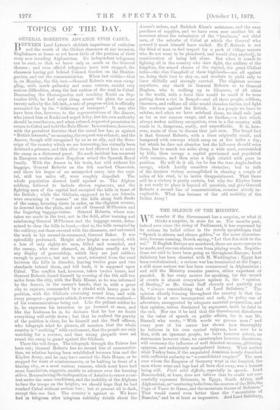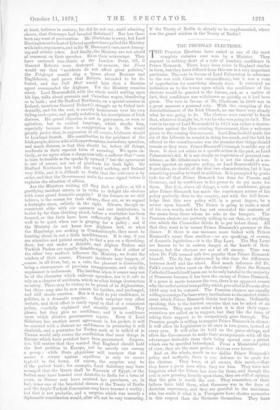THE SILENCE OF THE MINISTRY.
WE wonder if the Government has a surprise, or what it. thinks a surprise, in store for us. For months past, indeed ever since the rising of Parliament, it has expressed by its actions its belief either in the stately apophthegm that " Speech is silvern and silence golden," or the more character- istic, because cunning, Scotch saying," Let that flea stick in the- wa'." If English Envoys are murdered, there are more envoys to be made, and one can abstain even from pitying words. Negotia- tions are said to have been going on throughout Europe; Lord Salisbury has been closeted with M. Waddington ; Egypt has, been revolutionised ; a serious war has terminated at the Cape ; a still more serious war has been commenced in Afghanistan ; and still the Ministry remains passive, either expectant or puzzled. It has every motive for speaking, for the record of events is almost everywhere against it, the " opinion of Destiny," as Mr. Grant Duff cleverly and quaintly put it, " always contradicting that of Lord Salisbury." The opinion silently forming throughout the country is that the Ministry is at once incompetent and rash, its policy one of adventure, unsupported by adequate material preparation, and that opinion, unless dissipated by argument, must be fatal in the end. Nor can it be said that the Government disbelieves in the value of speech on public affairs, for it was Mr. Disraeli who wrote, " With words we govern mon ;" and every year of his career has shown how thoroughly he believes in his own cynical epigram, how sure lie is that, with an ignorant people, no facts however patent, no statements however clear, no catastrophes however disastrous, will overcome the influence of well directed sarcasm, glittering epigram, and audaciously manipulated history. What matter what Turkey loses, if the amputated dominion is only described with sufficient audacity as " a consolidated empire I" The man over whom the Emperor of Germany wept in the hospital, the man whose arms and legs had all been shot away, was a human being still. For nihil difficile, especially in speech. Lord Beaconsfield, at least, does not believe that he could not suc- cessfully represent Britannia, in Egypt, South Africa, and Afghanistan, as " scattering bolts from the sources of the Nilo, the Cape of Vasco de Game, and the mountain throne of Solomon." That would sound even better than the " mountains of Rasselas," and be at least as impressive. And Lord Salisbury, at least, believes in oratory, for did he.not say, amid admiring cheers, that Cetewayo had invaded Zululand ? Nor has there been any want of provocation. Mr. Gladstone is away, but Lord Hartington and a host of Liberal speakers have pelted the Ministry with facts, arguments, and in Sir W. Harcourt's case, most damag- ing and artistic jokes, And finally, the Ministry are not afraid of comment on their speeches. Even their acts escape. They have enslaved two-thirds of the London Press, till, if General Roberts were destroyed to-morrow, the Tittles would say that " accidents do not affect great policies," the Telegraph would sing a hymn about Romans and Englishmen, and prove that Roberts intended to be de- feated, and the ..Pall Mail would hint that a Russian agent commanded the Afghans. Yet the Ministry remains silent. Lord Beaconsfield, with the whole world waiting upon his lips, talks about peasants and Canadian wages, blundering as to both ; and Sir Stafford Northoote, on a special mission in Ireland, mentions General Roberts's struggle up to Cabul inci- dentally, and for the rest, is sweetly humourous over his own failing exchequer, and gently sedative in his descriptions of Irish distress. His grand objection is not to grievances, or even to agitation, but to excited language, which shocks him, especially because there is exaggeration in it. He would greatly prefer that, in expression at all events, Irishmen should be Lowland Scotch. His contribution to the guidance of the Irish people, driven wild with apprehensions, incendiary speeches, and much distress, is that they should be, before all things, moderate in their especial form of swearing. We agree en- tirely, as we agree when a clergyman tells a sufferer that " man is born to trouble as the sparks fly upward ;" but the agreement is one of assent, not one of gratitude for fresh light. Sir Stafford Northoote has told the world nothing, and Ireland very little, and it is difficult to doubt that the reticence is by order, and that the Government waits for some signal before it explains the situation of affairs. Are the Ministers waiting till they find a policy, or till a gratifying incident occurs, or in order to delight the electors with some grand dramatic surprise ? If the former, as we still believe, is the reason for their silence, they are, as we argued a fortnight since, entirely in the right. Silence, though,in- consistent alike with our manners and our institutions, is better by far than thinking aloud, before a resolution has been formed, or the facts have been sufficiently digested. It is well to be quiet when one is groping for a policy ; and if the Ministry do not know how Afghans feel, or what the Hapsburgs are seeking in Constantinople, they must be bunting about in not a little bewilderment. It is easy, if you are attentive and patient enough, to End a pea on a threshing- floor, but not under a thimble, and Afghan Sirdars and Turkish Pashas are equally thimble-riggers. But if either of the other two motives influence the Ministry, we doubt the wisdom of their course. Pleasant incidents may happen, of course, in all lives, but, as a rule, the pleasant is discernible, being a consequence of previous arrangements, and only the Unpleasant is unforeseen. The incident when it comes may not be of the character which enlivens speeches, nor is it safe to rely on a chapter of accidents, which as often brings destruction as safety. There may be victory to be proud of in Afghanistan, but there may also be new reason for further, and prolonged, and still sterile exertion. Nor is it well to put confidence, in politics, in a dramatic surprise. Such surprises very often irritate, and their effect is rarely equal to that of a consistent policy, carefully explained and steadily pursued. They please, but they give no confidence, and it is confidence upon which elective governments repose. Even if Lord Salisbury has another secret agreement in his pocket, it will bo scanned with a distrust no suddenness in producing it will diminish, and a guarantee for Turkey such as is talked of in Vienna would only revive the recollection that most things in Europe which have perished have been guaranteed. Jingoes, too, will mutter that they wanted that England should hold the first position in Europe, not be merely one among a group ; while State physicians will murmur that to assure a corpse against sepulture is only to assure typhoid to the house. Of course, the surprise may be of the perfect kind ; for example, Lord Salisbury may have arranged that the Queen shall be Suzerain of Egypt, or the Sultan may have handed over Anatolia to India for a term of years, or Greece may have received her provinces, or, in fact, some one of the beneficial clauses of the Treaty of Berlin and the Anglo-Turkish Convention may have become a reality ; but that is not probable, and a surprise which was merely a diplomatic combination would, after all; not be very reassuring.
If the Treaty of Berlin is already to be supplemented, where was the grand wisdom in the Treaty of Berlin ?

































 Previous page
Previous page